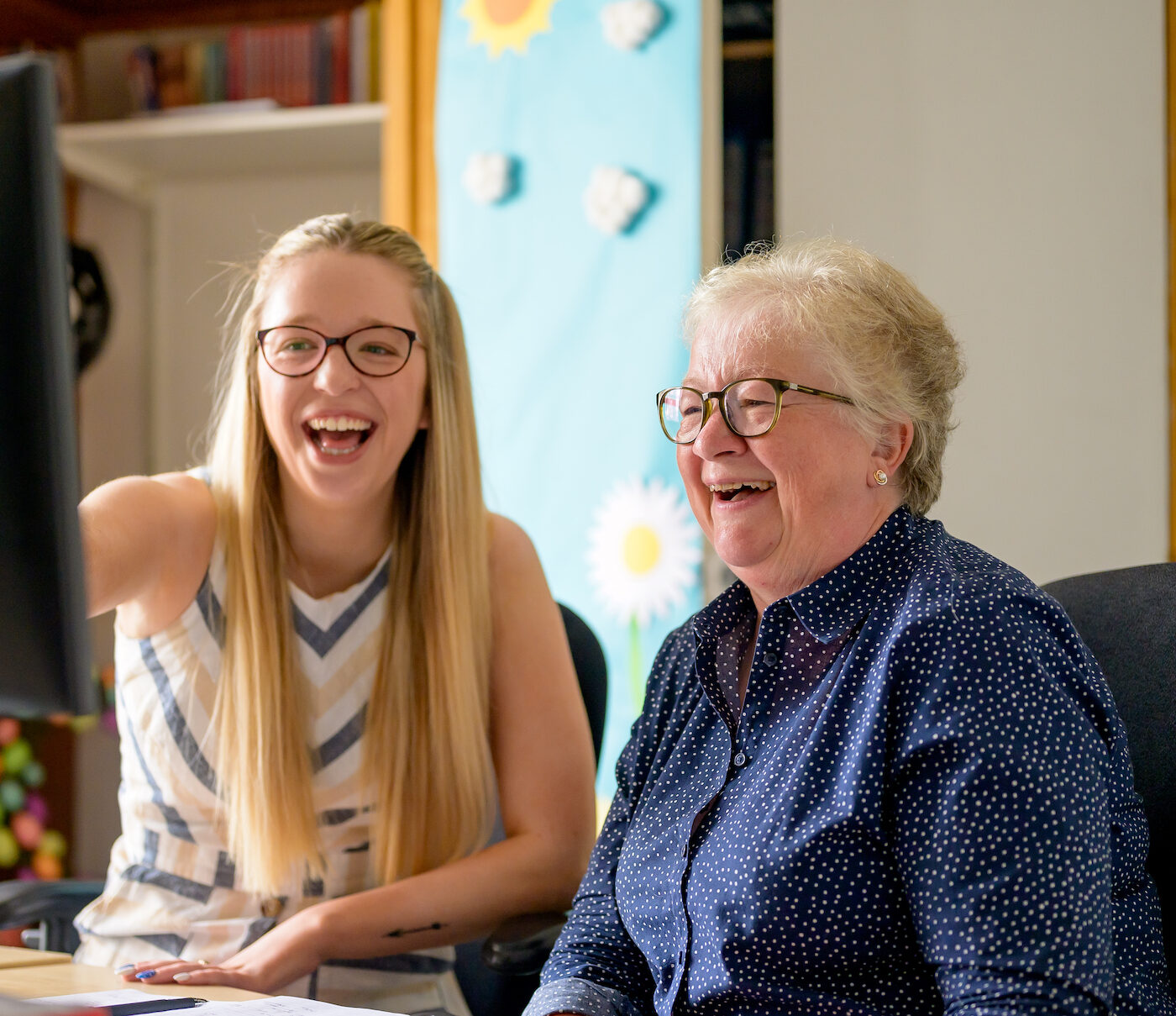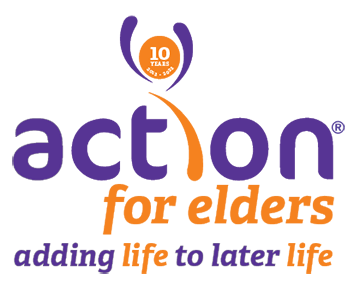How Action for Elders are helping older people stay connected
Tags
Articles

With more services in the UK moving to an online first approach, are older people getting left behind? We spoke to James Lewis, Chief Executive of Action for Elders about the work the charity is doing to help older people build new skills and feel more confident with technology. He spoke passionately about why there’s a balance to be made when it comes to online vs offline, and how we society as a whole can do more to empower those in later life.
What does Action for Elders do?
Action for Elders was formed in 2012 after a long period of research and development with Sheffield University. It was commissioned by the UK government at the time to look at the upcoming challenge of people living longer, because healthy ageing still exists around about the age of 63, according to national statistics, and yet people are living well into their 80s – 85 to 87 on average.
There’s an upcoming tsunami, maybe it’s already here, where for the first time in our history there’s more older people than there are under the age of five. The ageing population scenario is something which is a huge challenge for us here in the UK, and indeed in most countries in the world. So our brief was to look at how we can bring new initiatives to help older people age better and with a greater quality of life.
In the world there are various places called blue zones where people actually live longer. And they’re dotted around various parts of the world, but none are in Europe. Our research showed that in these blue zones, there are certain conditions which allow people to live healthier lives. One is they have a reasonably good diet with very little processed food. They take some sort of regular exercise every day. And, they also have a very good social network around them. And then underpinning all of that there is this attitude of resilience, a different, more positive attitude to ageing. So we brought all those together in a programme which we call Balanced Lives – focusing on physical, mental, and social well being. And we introduced this from 2012 into various communities and care homes within the UK.
On the social side, you do a lot of work to help older people get online easily and safely. Have you seen demand for this service increase as the world becomes more digital?
Our digital services grew in the pandemic, obviously with people being forced to go online.
Now, we’d done a bit of research previously under a campaign called Think Differently About Aging. One of the things we knew was that older people were reluctant to go online, and they were stuck in certain ways about a variety of things. They wanted to physically go into a bank, for example, and they didn’t feel that banking apps were secure.
But the pandemic to a degree changed that because it forced people to actually explore this. Now, we believed because of this research the one thing stopping older people going online was basically a lack of confidence. We knew going in and giving older people a tablet or smartphone, or sorting something out for them wasn’t going to work, they needed to build a relationship with the people helping them over a period of time. So that’s how we started and it was very successful, and we are now seeing an increase in older people actually coming to us for a variety of things.
Some have a computer, but nobody’s taught them how to operate it or what it can do. Once they’ve got that confidence, they really can shine. There’s all sorts of apps which we educate them on too, for example, teaching them that banking apps are very secure, showing people how to work shopping apps and order online. There’s a variety of technologies they come to us for. We’re also seeing an increase in people asking for help installing security doorbells.
June’s Action for Elders Story
June has cerebral palsy. Because mobility is a struggle for her she relied heavily on her Samsung tablet to stay in touch with friends and family. Unfortunately her tablet stopped working and no one was able to fix it. Action for Elders Digital Support Specialist Adrian Scott stepped in to get June back online.
In Wales we have an Older Persons Commission, there isn’t one in England yet, although they are lobbying for one. But the Older Persons Commissioner’s job is to highlight the challenges for those in later life in a variety of ways. In Wales the Commissioner developed a campaign which is basically that no older person should be digitally excluded.
We are particularly focused on people living in rural areas. We believe that our digital services can help older people stay connected to their families, if they have them, as most families don’t live in the same area these days.
But if they can’t do that, then they can build friendships with other people online. We show them how in a safe and secure manner. So there’s lots of things that come out of our digital work that enhances the independence of older people. That’s really part of our overall strategy.
But also the relationships that our staff and volunteers build with older people allow us to do other things to enhance their lives outside of technology too.
Could you give us an example of how this support can evolve into other things?
These can be simple things which have a big impact. In one case, we had a very vulnerable older lady who’s dog kept escaping from her home.
Our digital support person went and rescued the dog. Long story short, that happened three times. And this older person was extraordinarily vulnerable and the dog was hugely important in her life, and it wasn’t anyone’s fault that the dog was escaping. So we paid for the fee to get the dog out of the shelter it was taken to, we built a secure area in her backyard to keep the dog safe, and we arranged for neighbours to come help walk the dog. So it’s those more unexpected things that we get involved in through our digital services.

Do you think there's a digital divide happening, or that older people worry their world is getting smaller as more things move online?
No, I don’t necessarily think that’s the case. I think going online shouldn’t be the be all or end all of anyone’s life, it should be an added aspect of a person’s life.
And it certainly brings another dimension to life. It should enhance independence rather than retract it. We’re social animals, and we require face to face contact. But if you can’t go out every day for example, knowing how to talk to and meet people over video call with things like Zoom, or over Facebook, brings another dimension to life when you’re probably feeling a little lonely. We have an online group that meets on a Friday night to reduce loneliness, which might be one of the few chats those people have had that week.
I think you cannot say digital is going to be the answer to everything. But you can say that digital will enhance the lives of older people. As it does enhance all of our lives and in various ways, as long as we’re careful about it.
Online safety is obviously hugely important. How can older people stay safe online and avoid scams?
We’ve been involved with a research project with the University of Guildford for a number of years, which is all about building systems that older people can put in their computers to prevent phishing and scams.
Older people have all heard things about scamming, and scams are getting more sophisticated. We’re all susceptible, it isn’t just older people. I probably in a week get about three or four phone calls or emails,
We run a special workshop on scams and phishing, and showing people how to recognise these things is a very important part of our work. It’s about giving people reassurance. Making sure they know what to look out for, and if something does happen, that they know the steps to take to get money back from the relevant authorities and how to report it correctly.
Scamming is always going to be out there. I do think that perhaps companies should do more. But it’s our responsibility as a charity to educate people in regards to how they can limit it.
Spotting a scam - quick tips
- Look out for spelling errors or inconsistencies in text messages, emails, or letters
- The email address should match the company website. For example Paypal’s website is www.paypal.co.uk, and they usually send emails from the address services@paypal.co.uk. If it’s a personal email address or contains ‘outlook’ or ‘Gmail’ this is unlikely to be from a credible company.
- Scammers often rely on people making rash decisions. If you’re being pressured to do something quickly, don’t be afraid to seek advice from someone you trust.
- Never click on a link you’re unsure about. Signs a link may be suspicious include –
- It doesn’t match the companies website address that they are claiming to be from
- It contains a string of random letters or numbers
- It doesn’t contain HTTPS at the beginning of the link
- You’re unfamiliar with the company name or words in the link, or it doesn’t match the context of the rest of the message
- You weren’t expecting to receive it.
When it comes to physical, mental and social wellbeing in later life, what would you like to see change?
One of the things I think is that society has to change its attitude to older people and ageing dramatically and have a more positive attitude to the whole process. If you’re lucky enough to become old, research is showing right now that having a positive attitude to ageing and the ageing process can enable you to live an extra seven years of your life.
I think that we are responsible as a society to do two things, which I call age liberation. One is that we need to change structural ageism. So for example, in the media, we need to avoid negative words around ageing.
Secondly, we need to rethink the way medicine and hospitals look at the ageing process and start educating people about ageing a lot earlier, because it’s just another part of life. It has its challenges, but then other parts of life have their challenges as well.
So, I think that’s a really important message. Getting old, being old, is not necessarily the negative thing that society claims it to be.
There’s a lot of work to do on that subject which is why we work closely with other charities. It needs consistent education, consistent messaging, otherwise, we’re not going to change anything. And it’s in all of our interests. We’re all hopefully going to get older. So we want to grow older in a world where it’s comfortable to do so.
How to get involved with Action for Elders
Action for Elders is a registered charity that works to make older peoples’ lives better. Their staff and volunteers work throughout the UK, offering local support with physical, mental and social programmes.
Get online
Learn more about Action for Elders free digital inclusion services.
Get active
Find out more about Action for Elders free Balanced Lives fitness programme.
Get supporting
Find out how you can donate, fundraise, or volunteer.
Read our latest interviews
Browse our latest interviews, and research on elderly living, from leading national experts.